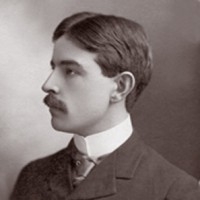
Shirley Wheeler Smith
The University of Michigan changed greatly during Shirley Wheeler Smith's 46-year career. In 1908, when the Board of Regents elected Smith to be secretary-a role in which he managed funds, maintained relations with alumni and edited the journal, Alumnus-the U-M had 5,000 students and an annual budget of $1,113,000. By 1945, the student body grew to 19,5000 and the budget expanded to $11,000,000. Throughout his long association with the university, Smith enjoyed a variety of different roles.
Born in Nashville, Michigan, in 1875, Smith graduated from Hastings High School at age 15, before graduating with a Bachelor of Laws degree from U-M in 1897. After his junior year, Smith-ahead of the current study abroad trend-spent his summer cycling across Europe. As an undergraduate at U-M, he served on the board of the Michigan Daily, won the Masterpiece Prize for best short story in the university's literary magazine, Inlander, served as managing editor of the Bulletin, and was president of his class during his senior year. His incisiveness and breadth of talent made Smith a valuable contributor to all of his projects, both as a student and later as a staff member at the university.
Smith As Screenwriter
At age 48, while working as a top university administrator, Smith wrote a story in which a scientist discovers a formula to make wood-repellent baseballs. The story was adapted into a film in 1949, when another U-M alumnus, Valentine Davies '25, decided to take on the project. Davies and Smith shared a writing credit for the Oscar-nominated film, "It Happens Every Spring," whose Michigan premier took place at the Michigan Theater. The city declared it "Shirley Smith Day," during which some of Smith's professor friends encouraged him to put his footprint in a cement slab, emulating his Hollywood peers. Smith, however, obstinately refused, saying he was "willing to go along with the ballyhoo in the abstract but not in the concrete."
After the celebrations ceased, Smith wrote to Sid Blumenstock of 20th Century Fox, "The celebration and tumult have died and I am now just another Smith in our town. However, the memory will linger a long time. There was an embarrassing moment now and then, but nothing that even flyspecks the recollection as a whole. The movie itself, as Val [Davies] wrote it and as 20th Century Fox put it on, seems to have pleased everybody."
A Michigan Legacy
Before starting his career at U-M, Smith worked for four years in the president's office of the Fidelity Mutual Life Insurance Company in Philadelphia. During this time, he gained invaluable work experience he would soon bring back to Ann Arbor.
Smith returned to Michigan in 1898, accepting a teaching position in the English department: it was the beginning of a lifetime of U-M service.
He became Secretary of the University on October 1, 1908. His job required him to edit and publish the Alumnus, an extensive correspondence with Michigan Alumni. He attended and participated in local alumni meetings throughout the country and solicited and managed gifts given by alumni to the university. In addition to these responsibilities, Smith edited and published the University News Letter and managed the creation of the General Catalog of Alumni.
Decades later, after excelling at his secretary position, Smith was named Vice President of the University on March 22, 1930.
Smith's literary pursuits never ceased-in his retirement he wrote biographies of U-M presidents James B. Angell and Harry B. Hutchins.
After a long, successful and varied career, Shirley Wheeler Smith died on February 16, 1959. He was 83. The memoir entered into the Regent's Proceedings following his death mourned his passing while acknowledging his wisdom and droll sense of humor, saying: "Jealous of the University's good name, he added much to her reputation for frugal living and high thinking. In his last years he played the part of elder statesman to his community. Young and old sought his sound judgment, valued highly his prudent advice, and treasured his keen wit."
- Cameron Stewart